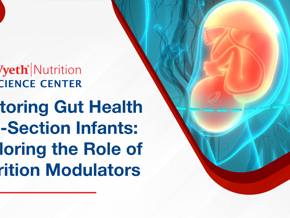Hot topics in bioactive nutrition – HMOs and MOS - Dr. Colin Cercamondi
Human milk oligosaccharides (HMOs) and bovine milk derived oligosaccharides (MOS) are bioactive components in infant nutrition. HMOs are non-digestible glycans that are highly abundant in human milk. More than 150 different HMOs have been identified and they can be categorized into fucosylated, non-fucosylated and sialyated HMOs. 2’fucosyllactose (2’FL) and Lacto-N-neotetraose (LNnT) are among the most abundant HMOs and are used to supplement infant formula. Increasing scientific evidence suggest that HMOs contribute to immune health in infants by promoting a balanced gut microbiota, preventing the adherence of pathogens in the gut, strengthening the gut barrier function and by directly modulating the immune system. MOS are primarily galacto- oligosaccharides (GOS) that are however unique from common GOS as the starting material is whey permeate (instead of pure lactose), which brings with it additional sialylated oligosaccharide.
In a randomized controlled trial (RCT) including a breastfed reference group, global composition of the gut microbiota in infants receiving a starter infant formula supplemented with 2 HMOs (1 g/L 2’FL and 0.5 g/L LNnt) was closer to the one in breastfed infants compared with their control peers not receiving HMOs. Higher abundance of beneficial bifidobacteria and lower abundance of potentially pathogenic bacteria were found in the HMO-group compared with the control infants. The number of infants with fecal community types typical for breastfed infants was higher in the HMO-group than in the control group and formula-fed infants with such a fecal community type were less likely to require antibiotics during the first year of life. This finding was in line with the lower rate of infection (lower respiratory tract infections, bronchitis) and reduced medication use (antibiotics, antipyretics) observed in the HMO-group compared with the control group.
In an RCT with MOS-supplemented starter infant formula (7.2 g MOS/L) including a breastfed group as reference, we observed a shift of the intestinal microbiota composition and diversity closer to those observed in breastfed infants in the infants receiving MOS-supplemented formula compared with the control group. Furthermore, infant formula with MOS promoted improved markers of gut defense, barrier and inflammation and reduced the counts of diarrheal pathogens.
In summary, these two studies clinically demonstrate the bioactive nature of HMOs and MOS by showing a gut microbiome modulating effect of HMOs and MOS as well as beneficial effects on gastrointestinal related immunity.
WYE-EM-107-MAY-20
Reference
Dr. Colin Cercamondi. 9th Annual Wyeth® Nutrition Science Center Global Summit. 2020
If you liked this post you may also like



![[Literature Library] Epitope-Specific Response of Human Milk sIgA in COVID-19 Recovered Women](/sites/default/files/styles/card_m_carousel_mobile/public/2021-07/205_COVID-opt.jpg?itok=YPO7jIYg)